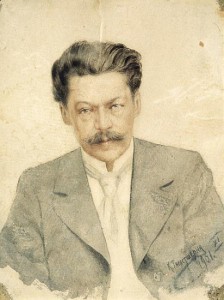“According to all testimony, his life had run a dissipated course between wine and card-playing. . . He will be soon forgotten.”
(Nikolai Rimsky-Korsakov – My Musical Life)
Never have your teacher write your obituary. Particularly when he gets it wrong . . .
Rimsky didn’t mention that Anton Arensky, his Russian student, wrote attractive music and was a skilled pianist.
He also omitted to mention that Arensky, remarkably for a 19th century musician, now has several recordings posted on YouTube.
They’re the real thing.
They may well colour the way you listen to his music.
The Gryphon Trio brings Arensky’s big, loveable, seriously romantic First Piano Trio to MusicTORONTO later this month.
So who was Anton Stepanovich Arensky?
His family in Novgorod were music-lovers and he was composing songs and piano music by the age of nine. By 18, he was studying with Rimsky-Korsakov at the St Petersburg Conservatory. “In his youth Arensky had not escaped entirely my own influence; later he fell under that of Tchaikovsky,” sniffed Rimsky-Korsakov, piqued that Arensky’s interests did not follow those of the Russian nationalists up the bald mountain, into the steppes of Central Asia and into the bedroom of Scheherazade.

Arensky (centre) was barely older than his students when he became a professor at the Moscow Conservatory at the age of 21.
In 1895, he followed Balakirev as director of the Imperial Chapel in St Petersburg, retiring six years later aged 40 – with all the financial dexterity of a present-day politician – with a pension of 6,000 rubles a year. On the surface, Arensky led a brilliant life as an accomplished composer, virtuoso pianist, gifted conductor, and distinguished teacher – with Rachmaninoff, Scriabin and Glière as pupils. But his early death at 45 from tuberculosis suggests a darker side. From the beginning, Arensky was addicted to drinking and gambling. When composing, he tended to burn the candle at both ends. His father was a doctor, but little of his father’s medical expertise was passed on to the son.
Stravinsky, another Rimsky pupil and a generation younger than Arensky, spoke highly of his fellow Russian. “Arensky was friendly, interested, and helpful to me,” he said. “In spite of Rimsky, I always liked him and at least one of his works – the famous Piano Trio in D minor. He meant something to me also by the mere fact of his being a direct personal link with Tchaikovsky.”
Arensky’s music, then, belongs in the tradition of Tchaikovsky and the mainstream European (Germanic) composers, rather than with the Russian Nationalists.
The St Lawrence played his wonderfully resonant string quartet at a Music TORONTO concert – the one with two cellos, with David Finckel – five years ago. Just a week or two ago, John Terrauds from the Toronto Star was praising Arensky’s chamber music. And I seem to remember Anagnoson and Kinton playing one of the two-piano Suites at a MT concert some years ago.
If we wish to dig a little deeper, we can also get an idea of exactly how Arensky himself performed this music.
Dating from the 1890s, they are pretty much the earliest recorded classical music we have. The music was recorded on an Edison phonograph by the Russia-based businessman, Julius H. Block.
The archive of 200 wax cylinders (more are known to have been made) include three excerpts from the Arensky D minor Piano Trio, with the composer playing piano. The recordings were made December 10, 1894, days after the premiere of the work.
How much can we hear of these 117 year-old recordings? Well, they’re fragile. “Not what you call pleasant to listen to,” in the words of audio-conservation engineer Ward Marston of Marston Records. But listen through the heavy surface noise and you’re inside a performance of considerable vitality, a world where the rubato is generous and the portamento (sliding on the strings) can make you reach for the Gravol. It helps if you prime yourself with a couple of listenings to a modern recording of the Arensky piano trio before stepping into the time machine. But what’s clear from the first scratch is that you’re in the presence of a pianist of considerable skill and some beautifully crafted music that spans the emotional gamut from elegy to joy.
Arensky Piano Trio recording (excerpts) from 1894, performed by the composer (piano) with Jan Hrimaly (violin) and Anatoly Brandukov (cello). First movement Scherzo Elegia
Gryphon Trio. Beethoven/Staniland/Arensky. Thursday November 17, 2011 – 8:00 pm. Jane Mallett Theatre, St. Lawrence Centre for the Arts, 27 Front Street East, Toronto

